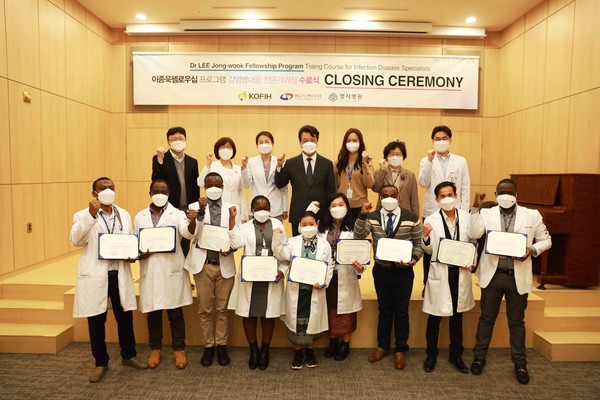Myongji Hospital said Friday that it has educated nine medical doctors and researchers from four countries as infectious disease experts by transferring the “K-quarantine” know-how.

On Thursday, the hospital held a graduation ceremony for the first nine graduates of the "Lee Jong-wook Fellowship Program Infectious Disease Response Specialist Course. The nine trainees came from Tanzania, Uganda, Laos, and Ethiopia.
The seven-week training course, organized by the hospital's ODA Project Team, includes theory education and field trips.
The training curriculum consisted of seven systematic educational modules -- new infectious diseases and issues, infectious disease response strategies, Korea's response to Covid-19, diagnosis and testing of infectious diseases, Covid-19 clinical and treatment, infectious disease research, patient safety, and medical quality, and action plan.
The hospital designed the education module based on its experience in responding to various infectious diseases such as H1N1 flu, Middle East Respiratory Syndrome (MERS), and Covid-19.
It provided one-on-one customized education between medical staff and trainees to resolve questions by visiting the Incheon Airport T1 Covid-19 Test Center operated by Myongji Hospital, the Korean Tuberculosis Association, and the National Medical Center to experience infectious diseases treatment first-hand.
Also, advisors of the trainees will visit their countries in July and conduct additional training, such as local evaluation, to see if the trainees are implementing the contents of the training in the field, and contributing to the response to the infectious disease in their homeland.
"I would like to express my gratitude to the trainees and advisors who faithfully engaged in education in difficult circumstances," Myongji Hospital Chairman Lee Wang-jun said. "Just like the Minnesota Project, where Korean doctors learned medicine in the U.S., I expect trainees to grow into experts who can pass on their knowledge to other countries in need."
Korea Foundation for International Healthcare (KOFIH) Secretary-General Ahn Kwan-soo also said, "I would like to thank Myongji Hospital for providing the best education to trainees despite the difficult situation due to Covid-19."
The KOFIH hopes that trainees will actively use what they have learned from the program to contribute to personal growth and the development of healthcare in each country, Ahn added.
Myongji Hospital established its Official Development Assistance Project Team in October last year. It started the project for developing countries, including KOFIH's Lee Jong-wook Fellowship Program and Korea International Cooperation Agency (KOICA)'s research projects.
The Lee Jong-wook Fellowship Program is an ODA project named after the late Dr. Lee Jong-wook, who served as the sixth director-general of the World Health Organization (WHO).
Myongji Hospital will begin the second course in May by inviting 22 medical staff and researchers from eight countries -- Laos, Mongolia, Cambodia, Uzbekistan, Ghana, Uganda, Tanzania, and Ethiopia – according to hospital officials.

